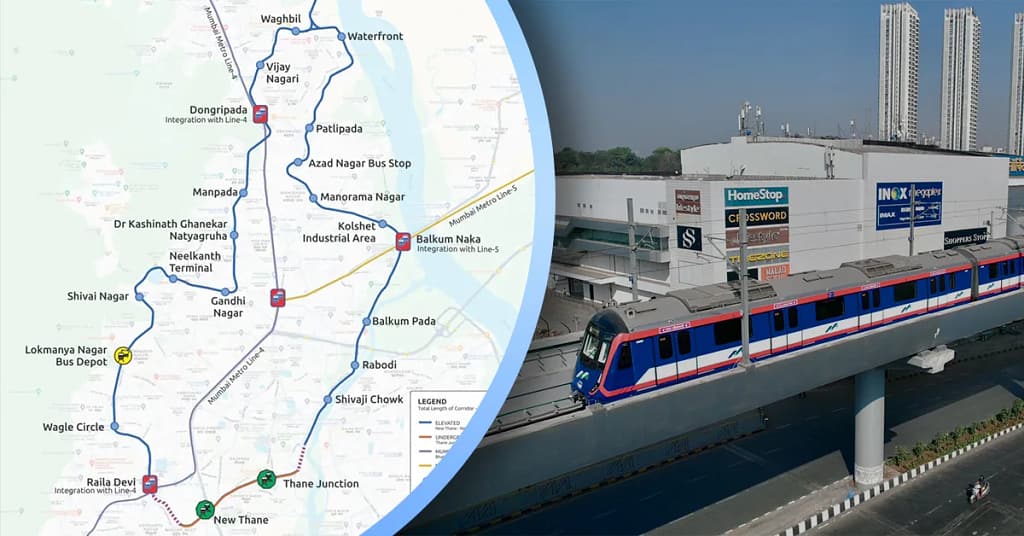In line with the rapid development taking place in Thane, the city’s public transport is all set to have a rapid transit system through the ambitious Thane Metro project. The central government has already approved this crucial project, also known as the Thane Integral Ring Metro Project, which is currently being implemented collaboratively by the Thane Municipal Corporation, MahaMetro, and the state government. The estimated cost of the project is ₹12,200.10 crore, which will be met through equal equity from the Government of India and the Government of Maharashtra as well as part-funding from bilateral agencies. Accordingly, the state cabinet, led by Chief Minister Devendra Fadnavis, has approved a loan for the project, which will accelerate the progress of the Thane Metro project in the coming days.
The Thane Integrated Ring Metro Project, named so because the route connects all major points in the city like a ring and also integrates with the Mumbai Metro and the Central Railway, was approved in a Union Cabinet meeting on August 16, 2024, chaired by Prime Minister Narendra Modi. This Ring Metro will be a 29-kilometre loop line encircling the western edge of the Thane city, with a station at each important area, such as Wagle, Manpada, Waghbil, Balkum, Rabodi, and so on. A total of 22 stations are proposed on the Thane Metro route, which will be bordered by the Ulhas River at one point and Sanjay Gandhi National Park at another. While 20 of these stations will be elevated, the remaining 2, at the Old Thane and New Thane railway stations, will be underground, ensuring connectivity to the Central suburban rail network. As for its integration with Mumbai Metro, the Thane Metro will have links to Mumbai Metro Line 4 (Green Line) and Metro Line 5 (Orange Line), which will enable commuters to reach various parts of Mumbai and MMR seamlessly and in an environmentally friendly way.
The Thane Ring Metro Project will be implemented by the Maharashtra Metro Rail Corporation Limited (MahaMetro). Following its successful execution of the Nagpur and Pune Metros, the MahaMetro has been entrusted with this responsibility. This ring metro project, connecting all key points for faster reach to major commercial and residential centres in Thane, will enable citizens to move quickly, safely, and in an environmentally friendly way. As a result, it will not only reduce traffic congestion on roads but will also help control pollution caused by vehicle emissions.
As stated earlier, the cost of the project (₹12,200.10 crore) will be financed by the Central and the Maharashtra governments on an equal equity basis. The state government has decided to adopt some innovative fundraising options under value capture financing (VCF), in addition to usual budgetary allocations for funding such a large project. This will include various types of VCF options, such as naming metro stations after the private enterprises located in those areas, commercializing certain sections of stations, monetizing rights, etc., which will reduce the project’s financial burden to some extent and accelerate its progress. Also, some funds will be raised as loans from various financial institutions at low interest rates, which will be repaid by the Mahametro. The state government will stand guarantor against these loans as required. It has also approved the signing of various agreements required for the project.
The Thane Ring Metro will not only present a refreshing, faster, and pollution-free commute and reduce the traffic load on the roads, but it will also drive a significant urban change in the city of Thane. In view of the high development and population growth of the city, the introduction of Thane Ring Metro is a prudent decision of the Fadnavis government, as this will provide a mass transit system for daily commuting and for reaching any part of the city with ease. It’ll also be a vital feeder into the wider Mumbai Metro network (Lines 4 and 5). The project is targeted for completion by 2029. According to the DPR estimates, approximately 6.47 lakh passengers will benefit from this metro service daily from the start. This number is projected to increase rapidly over the years, reaching 7.61 lakh in 2035 and 8.72 lakh in 2045.
Currently, MahaMetro has initiated the tendering exercise, which is at the final stages of document preparations. Soon, the awarding of the contracts will be completed. Both the central and state governments are emphasizing the timely completion of this project. Then there is constant monitoring by the CM Fadnavis himself! Historically, Thane grew as an industrial and residential suburb closely tied to Mumbai. However, the new Ring Metro project is expected to significantly boost Thane’s independence by strengthening its economy and infrastructure, allowing it to function more as a self-sustaining metropolis.
22 Stations on the Thane Integrated Ring Metro Project corridor
- New Thane (Underground)
- Raila Devi
- Wagle Circle
- Lokmanya Nagar Bus Depot
- Shivai Nagar
- Neelkanth Terminal
- Gandhi Nagar
- Dr. Kashinath Ghanekar Theatre
- Manpada
- Dongripada
- Vijaynagari
- Waghbil
- Waterfront
- Patilpada
- Azadnagar Bus Stop
- Manorama Nagar
- Kolshet MIDC
- Balkum Naka
- Balkum Pada
- Rabodi
- Shivaji Chowk
- Thane Junction (Underground)

